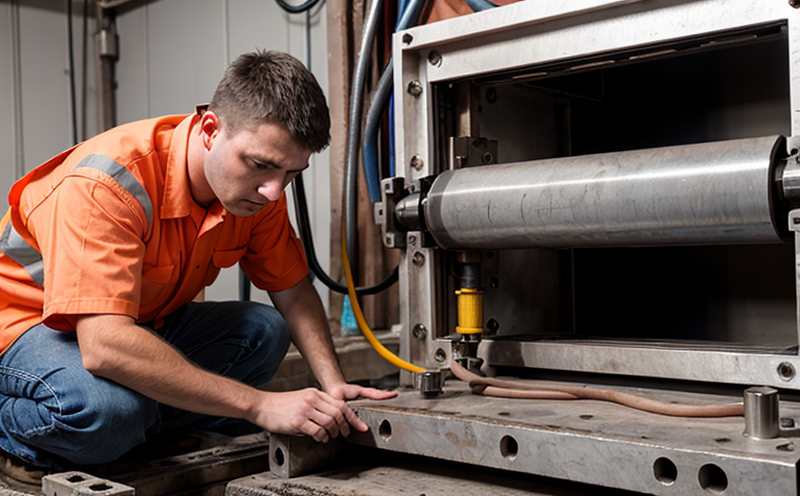IEC 60068 2 75 Mechanical Shock Testing of Lighting Equipment
The IEC 60068-2-75 standard is a crucial part of the international family of standards that governs the mechanical shock testing of lighting equipment. This test method evaluates the resistance of lighting equipment to mechanical shocks, ensuring they can withstand transportation and handling without compromising their functionality or safety.
The standard specifies the procedure for determining the ability of electrical and electronic equipment to resist mechanical shock during transport and handling. The test aims to simulate real-world conditions that may cause mechanical stress on lighting fixtures due to rough handling or transit. Compliance with this standard is essential in ensuring product reliability, reducing warranty claims, and maintaining a good reputation among consumers.
The testing process involves subjecting the specimen to a series of shock pulses along three axes (x, y, and z). The amplitude, duration, and frequency of these pulses are precisely defined by IEC 60068-2-75. This ensures that the equipment is subjected to standardized conditions, making it easier for manufacturers to compare test results across different products.
Proper specimen preparation plays a vital role in achieving accurate test results. Specimens should be representative of the actual product to be tested and include all components relevant to mechanical shock resistance. Preparing specimens according to these guidelines ensures that the testing accurately reflects real-world conditions, providing reliable data for decision-making.
The apparatus used for this test typically includes a shock machine capable of generating the specified pulses along each axis. This equipment must meet specific precision requirements to ensure accurate and repeatable results. The environment where the tests are conducted should also be controlled to minimize external influences that could affect the outcome.
Compliance with IEC 60068-2-75 is critical for manufacturers aiming to enter international markets, as many countries require compliance for certain products. Meeting this standard demonstrates a commitment to quality and safety, which can enhance market credibility and consumer trust.
Failure to comply with these standards could lead to product recalls, legal actions, and significant financial losses. By investing in mechanical shock testing according to IEC 60068-2-75, manufacturers can ensure their products meet the necessary safety and quality requirements, thus protecting both themselves and their customers.
Our laboratory offers comprehensive services for IEC 60068-2-75 compliance testing. We use state-of-the-art equipment to simulate real-world conditions accurately. Our experienced team ensures that every test is conducted rigorously and consistently with the standard, providing reliable and reproducible results.
Applied Standards
The IEC 60068-2-75 standard is part of a broader family of standards that collectively cover various aspects of environmental testing. Specifically, it deals with mechanical shock testing, which is essential for ensuring the durability and reliability of electrical and electronic equipment.
- IEC 60068-2-1: General requirements for the determination of environmental parameters
- IEC 60068-2-5: Tests on electrical and electronic equipment in normal atmosphere - Tests for altitude effects
- IEC 60068-2-13: Electrical and electronic equipment in normal atmosphere - Tests for temperature cycling
The application of these standards ensures that the testing process is standardized across different laboratories, providing consistent results. This standardization is particularly important in a global market where compliance with international norms is often required.
Our laboratory adheres strictly to all relevant IEC and other applicable standards during our testing processes, ensuring that we deliver accurate and reliable test results every time.
Eurolab Advantages
At Eurolab, we pride ourselves on offering comprehensive services tailored specifically to meet the needs of our clients in the lighting industry. Our laboratory is equipped with advanced testing facilities designed explicitly for IEC 60068-2-75 compliance tests, ensuring that your products undergo rigorous and precise evaluations.
Our experienced team comprises highly skilled professionals who understand the nuances of this standard deeply. They work closely with you to ensure specimen preparation meets the highest quality standards required by the test, enhancing the accuracy of the results obtained. Our commitment to excellence extends beyond just meeting compliance requirements; we aim to exceed expectations by providing detailed reports and recommendations based on our findings.
By choosing Eurolab for your IEC 60068-2-75 testing needs, you gain access to cutting-edge technology and expert knowledge. Our laboratory adheres strictly to all relevant international standards throughout the entire testing process, ensuring that every detail is accounted for and reported accurately.
In addition to our technical expertise, we also offer support services such as consultation on specimen preparation, interpretation of test results, and guidance on necessary adjustments required based on findings. This holistic approach ensures not only compliance but also continuous improvement in product quality.
Quality and Reliability Assurance
To ensure the highest level of quality and reliability in our testing services, Eurolab employs a robust Quality Management System (QMS) that complies with ISO 9001:2015. This system ensures consistent application of best practices throughout all stages of the testing process.
- Accurate Specimen Preparation: Ensures that each specimen is representative and prepared according to strict guidelines provided by IEC 60068-2-75.
- Precision Equipment: Utilizes advanced shock machines capable of generating precise pulses along all three axes, ensuring accurate simulation of real-world conditions.
- Controlled Environment: Maintains a stable environment free from external disturbances that could affect test outcomes.
The use of these measures guarantees consistent and reliable testing results. Our rigorous quality control processes further enhance the accuracy and reliability of our findings, providing you with confidence in your product's performance and durability.
We also provide detailed reports summarizing all aspects of each test conducted, including any deviations from expected outcomes or areas requiring improvement. These insights allow manufacturers to make informed decisions about necessary adjustments to their products before they reach the market.





